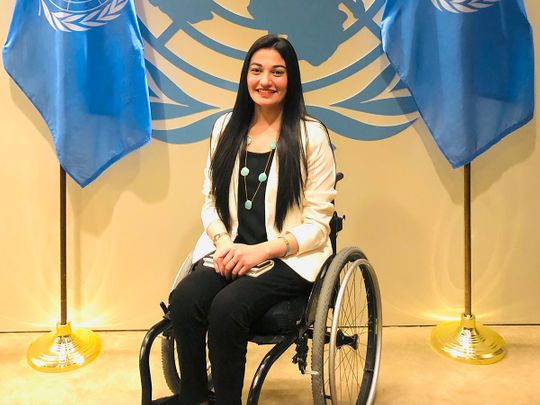
Dubai: She has a lot of titanium in her arm; there’s also a lot of metal in her back. People call her the ‘Iron Lady of Pakistan’, who has always stood tall in the face of adversity while seated in her wheelchair.
Her name is Muniba Mazari, an activist, anchor, artist, model, singer and motivational speaker. Ahead of the International Day of Persons with Disabilities on December 3, she wowed and inspired a crowd who watched her share her story at Expo 2020 Dubai’s Jubilee Park recently.
At the event titled ‘Pakistan – Connected Through Diversity’, Mazari went onstage in her wheelchair, which she has been using after surviving a horrific car accident 13 years ago. Her message was loud and clear: “It was time to break stereotypes and revise the script.” She added it’s better to use the term “differently-abled” over “disabled”.
Sharing her story with a smile
Mazari said: “We are going to celebrate compassion and kindness. We live in a world which tends to celebrate sameness, where people see the world the way they want to see it – a world where people are labelled as crippled, handicapped and disabled. Let’s change the narrative and replace these negative labels with positive words like ‘courageous’ and ‘resilient’.”
She added: “Following a horrific car accident 13 years ago, doctors have put a lot of titanium in my arm, there’s a lot of metal in my back. Maybe that’s why back home people call me the ‘Iron Lady of Pakistan’. But every time I say all of this, I do so with a smile on my face and I can see the audience smiling too. It reminds me of a beautiful quote, which says when you share the story of your pain and it does not make you cry, it means you have healed. And I think I have,” she added.
Art of healing
Mazari, who is a proud mother of a 10-year-old boy she adopted, said the most devastating moment of her life was the day she was told she would never be able to be a mother. “I have always loved kids. Plus, women have been conditioned that if they cannot reproduce they are useless.”
It was a crushing blow, but just as she was on the verge of giving up on everything, her brother – who she credits for being her rock throughout her journey – brought some paints and papers to the hospital and she found an escape in art.
“Pursuing my dreams to be an artist was my way to change my narrative,” said Mazari, who describes her first attempts with her “deformed hand” as “hideous.”
Persevering throughout her 26-month recovery period, with the slogan ‘Let Your Walls Wear Colours’, she has since gone on to create her own art brand called ‘Muniba’s Canvas’. She has also presented her work in several exhibitions, with her first international exhibition hosted by the Consulate General of Pakistan in Dubai.
“This is the story of a woman who has always tried to stand tall in the face of diversity while sitting in a wheelchair. I prefer to call what happened to me an ‘incident’ as opposed to an ‘accident’, as it has made me who I am today. It deformed my body, but it transformed my soul,” Mazari underlined.
Always forward
Faced with the choice to sit in a corner and wait for a miracle to happen or to “move forward with grace and gratitude”, Mazari said the miracles manifested themselves when she accepted herself the way she was.
She went on to not just overcome this fear, but she crushed it. Her Ted Talk, ‘We are all Perfectly Imperfect’, went on to garner over 19 million views online. She was also chosen as the ‘Pond’s Miracle Woman’ and by international hairdressing salon, Toni & Guy, to become the first-ever wheelchair-using model in Asia with a campaign titled ‘Women of Substance’.
In June 2019, Mazari was appointed by Pakistan’s Prime Minister Imran Khan to be a part of Pakistan’s first ever National Youth Council. She is also the First Pakistani UN Goodwill Ambassador for UN Women. She is also recognised as one of BBC’s 100 Inspirational Women of 2015, and one of Forbes 30 Under 30.
Mazari advised: “Dream big. Aim high and believe in yourself. Because if a woman in a wheelchair can do all this, what’s stopping you?”


